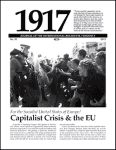Trotskyism vs Castroism
IBT Remarks at SA/SWP Cuba Confab
The following remarks are a slightly edited version of those made by an IBT supporter at a Cuba Solidarity meeting co-sponsored by Socialist Action and the Socialist Workers Party (SWP), on 20 July 2012 in Hartford, Connecticut. In 1963, the leaders of the Revolutionary Tendency of the SWP, whose political positions the IBT upholds today, were expelled from the ostensibly Trotskyist SWP for opposing the party’s political support to Fidel Castro and the Cuban Communist Party. The RT correctly characterized Cuba as a deformed workers’ state not qualitatively different from China, Vietnam, etc. By the 1980s the SWP, under the leadership of Jack Barnes, formally repudiated Trotskyism while continuing to adulate Castro’s Stalinist regime. In the course of making the “turn” away from any pretense of Trotskyism, many former SWP cadres were expelled, some of whom went on to found Socialist Action.
I am a supporter of the International Bolshevik Tendency. As Trotskyists, we defend the achievements of the Cuban Revolution in the areas of education, housing and healthcare. The reason there is none of the endemic disease and desperate poverty so common throughout the rest of the region is because the Cuban ruling class was expropriated during the revolution and now resides in Miami, not in Havana. As revolutionary socialists, we of course also call for the immediate release of the Cuban 5 [who were convicted of infiltrating counterrevolutionary Cuban terrorist organizations by U.S. courts and have been unjustly imprisoned].
However, our attitude toward Cuba cannot be uncritical. As Socialist Action put it: “Part and parcel of our defense of the revolution is telling the truth about it” (“The Cuban Revolution—Beleaguered but Undaunted”). The truth is that, unlike the Russian Revolution of 1917, the Cuban Revolution was not led by a proletarian party. As a result, it suffered severe deformations from its inception. Perhaps the most glaring one is the absence of workers’ democracy. It is indicative that the supporters of the ostensibly Trotskyist Partido Obrero Revolutionario (POR) were arrested by the Castro regime on 18 August 1962 and only released when they renounced the struggle for their ideas. This was classic Stalinism.
For decades the Castro leadership has promoted the “socialist family” like every other Stalinist regime. Cuba’s 1976 constitution formalized the Communist Party’s political monopoly as “the highest leading force of the society and of the state.” The party did not hold its first congress until 1975—16 years after Castro came to power. That meeting concluded, in classic Stalinist style, with a unanimous endorsement of the party leadership.
However, Socialist Action views the Castro clique as revolutionary internationalists. There is no denying the useful work of Cuban doctors abroad and Cuba’s role in driving South Africa’s apartheid army out of Angola in the 1970s. On the other hand, Castro supported the invasion of Czechoslovakia by Soviet tanks in 1968 and Cuba has shored up the credibility of numerous capitalist governments in Latin America. When the pope visited Cuba in 1998 Fidel Castro pointed to the supposed similarity between socialism and Catholicism in promoting the “equitable distribution of wealth and solidarity among human beings” (Granma, English edition, 22 March 2012). A revolutionary regime could not countenance any of this.
Socialist Action attempts to alibi the unpleasant truth about the Cuban regime as [attributable to] a Stalinist bureaucratic wing (originally tied to the Soviet bureaucracy) against which the supposedly revolutionary Castro wing is struggling. The Soviet Union has been gone for 20 years and very little has changed within the bureaucracy. The reason that the Cuban regime is so similar to other deformed workers’ states (like China and Vietnam) is because they were all created by victorious peasant-based insurgencies in which the politically conscious working class played no significant role—unlike the Bolshevik Revolution of 1917. The devolution of [SWP founder James P.] Cannon’s SWP into the bizarre Barnes cult began with the uncritical embrace of Castro and the guerrilla road as a viable alternative to the proletarian-centered strategy codified in Trotsky’s Transitional Program. The duty of revolutionaries today is not to promote illusions in any wing of the Cuban Communist Party, but rather to point to the necessity for workers to oust the bureaucrats and establish direct organs of proletarian rule.

